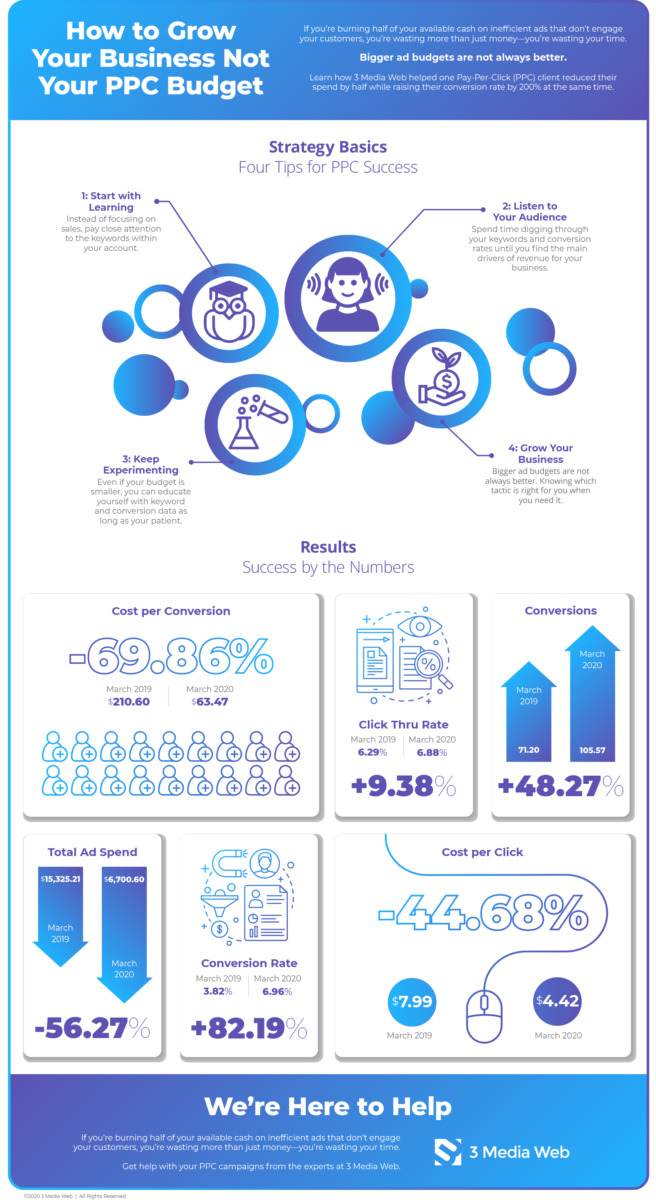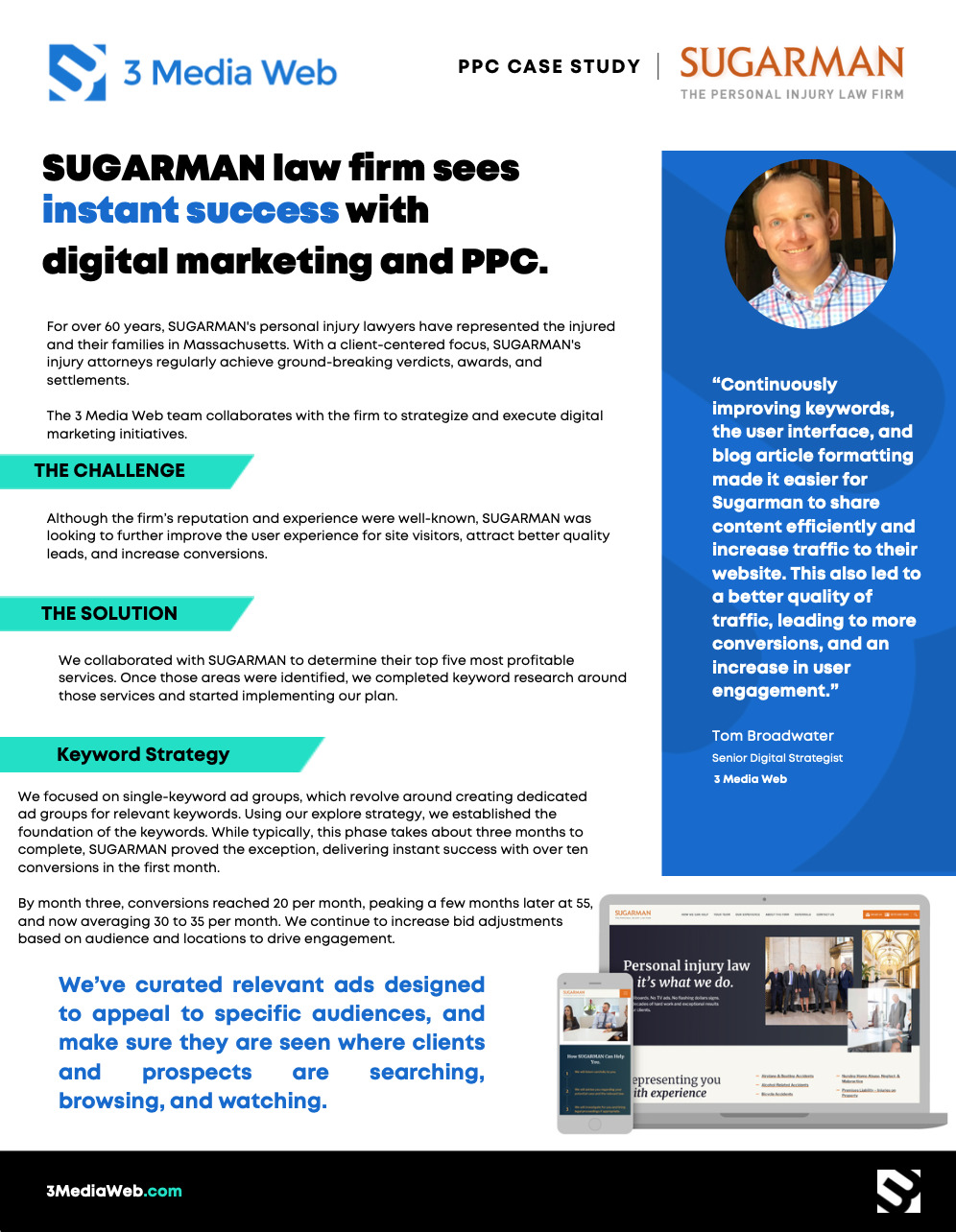PPC campaigns with bigger ad budgets are not always better.
If you’re burning half of your available cash on inefficient ads that don’t engage your customers, you’re wasting more than just money––you’re wasting your time.
Before you start spending more money in your Pay-Per-Click (PPC) campaigns, find out how – with the help of 3 Media Web – one client reduced their spend by more than half while, at the same time, they increased their conversion rate by 82% year over year.
Many digital marketing companies want a client business to crank up their ad budgets right away. That’s not always the smart choice.
The smart choice is to learn as much as you can about your audience, find out the keywords that already work for them, and double-down on the keywords that drive real revenue.
Are you targeting a lot of keywords? You may be competing against your own ads.
What is a PPC Conversion?
A conversion is simply the action that you want a user to take once they’ve click on your ad. That means it can be anything from downloading an ebook, submitting a contact form on your website, or completing a purchase through an e-commerce store. You can set your PPC conversion tracking based on your current campaign to track only, and exactly, what your business needs in order to make the right decisions on PPC budget, duration, keyword strategy, and more.
Review Your Current Keywords & Conversions
The lottery-like feel of running a PPC campaign leads to bad habits. The most common bad habit is impatient, spending too much––or too little––and expecting huge, immediate returns in the form of sales. Instead of focusing on sales, pay close attention to the keywords within your account.
Which keywords outperform all of the rest? What keywords converted, the best cost-per-click (CPC), and the best click-through-rate (CTR)? 3 Media Web looked closely at the first three months of the client’s PPC campaign data during 2019 with a tight focus on conversions. Another helpful data set is the actual search queries connected to the keywords that drove conversions.
The number of sales may be less important than your costs for each of those conversions. Focus instead on your conversion rates to run your PPC campaign like a series of experiments, optimizing over time. That’s how you can find real results that drive growth for your business more consistently.
Identify The Main Drivers For Your Audience
Before you start spending your ad budget, make sure you know the audience that you’re trying to reach. Spend time digging through your keywords and conversion rates until you find the main drivers of revenue for your business. The keywords doing the most for you deserve the most of your time and attention.
Back in September of 2019, we started looking at the data from our client’s past year of PPC campaign performance. Then, setting the first three months of the year as a target, we worked to continually optimize the PPC process for six months, until we hit our best month by far, in March of 2020.
Keywords are sometimes seasonal, they rise up and down in impressions. That’s why it’s important to look for keywords that converted visitors in both the last three months and throughout the past year. After a year of spending in Google Ads without a narrow focus, the client had a lot of keyword and conversion data to help us select the right keywords. We found that up to 60-70% of their spend was being burned up competing against other keywords within the same ad groups.
We decided to filter down their keyword targets. We set a goal of hitting the same conversion numbers, but at a fraction of the cost.
Actual Results Using Our Focused PPC Approach
Let’s jump right into the results to see if this strategy actually worked.
Remember our goal: to hit the same amount of conversions at a fraction of the cost.
| March 2019 | March 2020 | Delta | |
| CTR: | 6.29% | 6.88% | 9.38% |
| Average CPC: | $7.99 | $4.42 | -44.68% |
| Cost: | $15,325.21 | $6,700.60 | -56.27% |
| Conversions: | 71.20 | 105.57 | 48.27% |
| Cost / Conversions: | $210.60 | $63.47 | -69.86% |
| Conversion Rate: | 3.82% | 6.96% | 82.19% |

After seeing those results, it’s easy to fall into the trap of expecting exponential growth for the foreseeable future. Instead, start minimizing your risk, cleaning up your account even further to find your true cost of conversion.
You may also find that your website conversion rate needs to improve in order to improve the health of your PPC marketing campaigns. Otherwise, you’ll still be wasting your spend on inefficiencies.
Fools Rush In, Experimenters Are Patient
The success of this PPC campaign is a result of the big pile of keyword and conversion data after a year of broad spending. If you’re going to run a PPC campaign yourself, you may not need to spend money to learn about your audience for a full year, but expect to for the first few months.
When you’re working with Google Ads, be prepared to lose money for the first three months, as you need data to learn what keywords convert for your audience.
Even if your budget is smaller, you can educate yourself with keyword and conversion data as long as you’re patient. You can work to increase your conversion costs and reinvest the successes into the next experiments. It might take a full year to get the same amount of data as a larger campaign would in a single quarter, but you’re also saving money.
Grow Your PPC Conversions, Not Your Budget
Sometimes a business needs to tighten their belts. Sometimes it’s time to put up the capital and double-down on what works. The trick is knowing which tactic is right for you when you need it.
With the help of 3 Media Web, this client of 3 Media Web reduced their spend by more than half while raising their conversion rate by 82%, year over year.
That’s why bigger ad budgets are not always better.
If you’re burning half of your available cash on inefficient ads that don’t engage your customers, you’re wasting more than just money––you’re wasting your time.
Are you targeting a lot of keywords? You may be competing against your own ads.
Get help with your PPC campaigns from the experts at 3 Media Web. Contact us today for a free PPC consultation!

